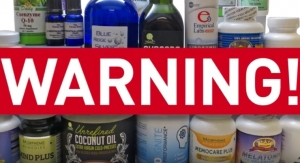04.16.19
The FDA has unveiled its new Dietary Supplement Ingredient Advisory List, a rapid-response tool intended to alert the public quickly when the agency identifies ingredients that do not appear to be lawfully marketed in dietary supplements. Initial ingredients on this list include andarine, higenamine, hordenine, and 1,4-DMAA.
Ingredients are added to the list based on a preliminary assessment by FDA; the list allows the agency to communicate with the public while it completes a final determination.
Consumers may want to avoid buying and using products marketed as dietary supplements containing these ingredients, the agency said, and industry may want to avoid making or selling products marketed as dietary supplements containing these ingredients.
The list is not exhaustive and will be updated as ingredients are added to or removed from it, FDA said. The agency welcomes additional feedback and information, including information that may support or refute the FDA’s preliminary assessment, regarding ingredients on the list. FDA intends to communicate separately any time it identifies safety concerns about dietary ingredients or supplements.
Individuals with questions about dietary supplements can Submit an Inquiry, or visit www.fda.gov/fcic for additional information.
FDA Deputy Commissioner for Food Policy and Response Frank Yiannas issued a statement about the effort to protect consumers from unlawful ingredients in dietary supplements, saying, “While many dietary supplements meet the FDA’s standards, there are some companies who knowingly distribute and sell dangerous or otherwise illegal products that put consumers at risk. As the agency entrusted with the oversight of dietary supplements, we will not stand by and allow these companies to compromise the health of the very people who are seeking out supplements to aid in their well-being.”
As the dietary supplement marketplace has grown, the introduction of new ingredients often raises complex questions involving science, policy, and the law, Yiannas continued. “In the time it takes the FDA to make a final determination, consumers and industry might mistakenly conclude that a lack of action by the FDA indicates that these ingredients are lawful. This List is intended to get information to both consumers and industry more quickly. It also provides an opportunity for stakeholders to share information with us that they think might be relevant to our determination.”
Andrew Shao, PhD, interim senior vice president, scientific & regulatory affairs, Council for Responsible Nutrition (CRN), noted that "Protecting consumers from ingredients that appear to be unlawfully marketed in dietary supplements is a critical component of FDA’s regulatory oversight, and so we are pleased that a new platform to alert consumers more rapidly than in the past has been established. We recommend that consumers bookmark and regularly visit the Ingredient Advisory List.”
In addition to rapidly alerting the public, the new tool will allow FDA to exert greater regulatory enforcement in the face of limited resources, he added. “CRN stands strong with FDA in its fight against companies who are deliberately violating the law, and we encourage the mainstream dietary supplement industry to do the same. By embracing FDA’s new tool, the industry demonstrates support for the agency’s efforts to preserve the balance between access and safety for the 170 million Americans taking dietary supplements each year.”
“Together, with FDA, the mainstream dietary supplement industry is committed to providing consumers with safe, high-quality dietary supplements, Shao continued. “CRN is eager to collaborate with FDA as the agency unveils initiatives, like the Dietary Supplement Ingredient Advisory List. In the meantime, we hope the agency’s announcement serves as a clear warning to bad actors in the fringes of our industry—the regulators are coming for you if you attempt to skirt the law.”
DMHA and Phenibut
The agency also issued 11 warning letters on Apr. 16 to companies selling products containing DMHA or phenibut.
Eight warning letters were issued to companies whose products are marketed as dietary supplements and labeled to contain DMHA. DMHA has been found in numerous dietary supplement products, often marketed for sports performance and weight loss. The FDA said it determined that DMHA is either a “new dietary ingredient” for which the FDA has not received the required New Dietary Ingredient notification or that it is an unsafe food additive. The FDA considers dietary supplements containing DMHA to be adulterated.
DMHA is also known as:
FDA also issued three warning letters to companies whose products are marketed as dietary supplements and labeled to contain phenibut. Phenibut has been found in products labeled as dietary supplements, sometimes marketed as a sleep aid. According to FDA, phenibut does not meet the definition of a dietary ingredient Under the Federal Food, Drug, and Cosmetic Act (FD&C Act). Products labeled as dietary supplements that list phenibut as a dietary ingredient are therefore misbranded.
Phenibut is also known as:
The companies have 15 business days from the date of receipt of the letter to communicate to the agency the specific steps they will take to bring their products into compliance with the law. The warning letters also caution companies that FDA may take enforcement action without further notice if they do not immediately cease distribution of the products.
“We take these violations very seriously and stand ready to take enforcement action without further notice if the companies do not immediately cease distribution of the products,” said Yiannas. “We are firmly committed to ensuring that products sold as dietary supplements meet the law’s requirements for dietary supplements, and most importantly, do not put consumers at unnecessary risk. Further, other companies marketing similar illegal products should take note—we will continue to take the necessary steps to protect the American public from ingredients that aren’t allowed in dietary supplements.”
FDA said a reaffirmed commitment to traditional advisory and enforcement actions, such as warning letters, in combination with the Dietary Supplement Ingredient Advisory List, are integral parts of the agency’s effort to strengthen the regulation and oversight of dietary supplements.
“We continue to look for ways to modernize our approach to protecting consumers from misbranded, unsafe, or otherwise unlawful dietary supplements,” the agency said in a statement.
Ingredients are added to the list based on a preliminary assessment by FDA; the list allows the agency to communicate with the public while it completes a final determination.
Consumers may want to avoid buying and using products marketed as dietary supplements containing these ingredients, the agency said, and industry may want to avoid making or selling products marketed as dietary supplements containing these ingredients.
The list is not exhaustive and will be updated as ingredients are added to or removed from it, FDA said. The agency welcomes additional feedback and information, including information that may support or refute the FDA’s preliminary assessment, regarding ingredients on the list. FDA intends to communicate separately any time it identifies safety concerns about dietary ingredients or supplements.
Individuals with questions about dietary supplements can Submit an Inquiry, or visit www.fda.gov/fcic for additional information.
FDA Deputy Commissioner for Food Policy and Response Frank Yiannas issued a statement about the effort to protect consumers from unlawful ingredients in dietary supplements, saying, “While many dietary supplements meet the FDA’s standards, there are some companies who knowingly distribute and sell dangerous or otherwise illegal products that put consumers at risk. As the agency entrusted with the oversight of dietary supplements, we will not stand by and allow these companies to compromise the health of the very people who are seeking out supplements to aid in their well-being.”
As the dietary supplement marketplace has grown, the introduction of new ingredients often raises complex questions involving science, policy, and the law, Yiannas continued. “In the time it takes the FDA to make a final determination, consumers and industry might mistakenly conclude that a lack of action by the FDA indicates that these ingredients are lawful. This List is intended to get information to both consumers and industry more quickly. It also provides an opportunity for stakeholders to share information with us that they think might be relevant to our determination.”
Andrew Shao, PhD, interim senior vice president, scientific & regulatory affairs, Council for Responsible Nutrition (CRN), noted that "Protecting consumers from ingredients that appear to be unlawfully marketed in dietary supplements is a critical component of FDA’s regulatory oversight, and so we are pleased that a new platform to alert consumers more rapidly than in the past has been established. We recommend that consumers bookmark and regularly visit the Ingredient Advisory List.”
In addition to rapidly alerting the public, the new tool will allow FDA to exert greater regulatory enforcement in the face of limited resources, he added. “CRN stands strong with FDA in its fight against companies who are deliberately violating the law, and we encourage the mainstream dietary supplement industry to do the same. By embracing FDA’s new tool, the industry demonstrates support for the agency’s efforts to preserve the balance between access and safety for the 170 million Americans taking dietary supplements each year.”
“Together, with FDA, the mainstream dietary supplement industry is committed to providing consumers with safe, high-quality dietary supplements, Shao continued. “CRN is eager to collaborate with FDA as the agency unveils initiatives, like the Dietary Supplement Ingredient Advisory List. In the meantime, we hope the agency’s announcement serves as a clear warning to bad actors in the fringes of our industry—the regulators are coming for you if you attempt to skirt the law.”
DMHA and Phenibut
The agency also issued 11 warning letters on Apr. 16 to companies selling products containing DMHA or phenibut.
Eight warning letters were issued to companies whose products are marketed as dietary supplements and labeled to contain DMHA. DMHA has been found in numerous dietary supplement products, often marketed for sports performance and weight loss. The FDA said it determined that DMHA is either a “new dietary ingredient” for which the FDA has not received the required New Dietary Ingredient notification or that it is an unsafe food additive. The FDA considers dietary supplements containing DMHA to be adulterated.
DMHA is also known as:
- 1,5-Dimethylhexylamine
- 1,5-DMHA
- 2-amino-5-methylheptane
- 2-amino-6-methylheptane
- 2-aminoisoheptane
- 2-Heptylamine, 6-methyl-
- 2-Isooctyl amine
- 2-Metil-6-amino-eptano
- 6-Amino-2-methylheptane
- Amidrine
- Octodrine
- Vaporpac
FDA also issued three warning letters to companies whose products are marketed as dietary supplements and labeled to contain phenibut. Phenibut has been found in products labeled as dietary supplements, sometimes marketed as a sleep aid. According to FDA, phenibut does not meet the definition of a dietary ingredient Under the Federal Food, Drug, and Cosmetic Act (FD&C Act). Products labeled as dietary supplements that list phenibut as a dietary ingredient are therefore misbranded.
Phenibut is also known as:
- fenibut
- phenigam
- PhGaba
- Phenigamma
- Phenygam
- 4-Amino-3-phenylbutanoic acid
- β-(aminomethyl)benzenepropanoic acid
- beta-(Aminomethyl)hydrocinnamic acid
- β-phenyl-γ-aminobutyric acid
The companies have 15 business days from the date of receipt of the letter to communicate to the agency the specific steps they will take to bring their products into compliance with the law. The warning letters also caution companies that FDA may take enforcement action without further notice if they do not immediately cease distribution of the products.
“We take these violations very seriously and stand ready to take enforcement action without further notice if the companies do not immediately cease distribution of the products,” said Yiannas. “We are firmly committed to ensuring that products sold as dietary supplements meet the law’s requirements for dietary supplements, and most importantly, do not put consumers at unnecessary risk. Further, other companies marketing similar illegal products should take note—we will continue to take the necessary steps to protect the American public from ingredients that aren’t allowed in dietary supplements.”
FDA said a reaffirmed commitment to traditional advisory and enforcement actions, such as warning letters, in combination with the Dietary Supplement Ingredient Advisory List, are integral parts of the agency’s effort to strengthen the regulation and oversight of dietary supplements.
“We continue to look for ways to modernize our approach to protecting consumers from misbranded, unsafe, or otherwise unlawful dietary supplements,” the agency said in a statement.




























